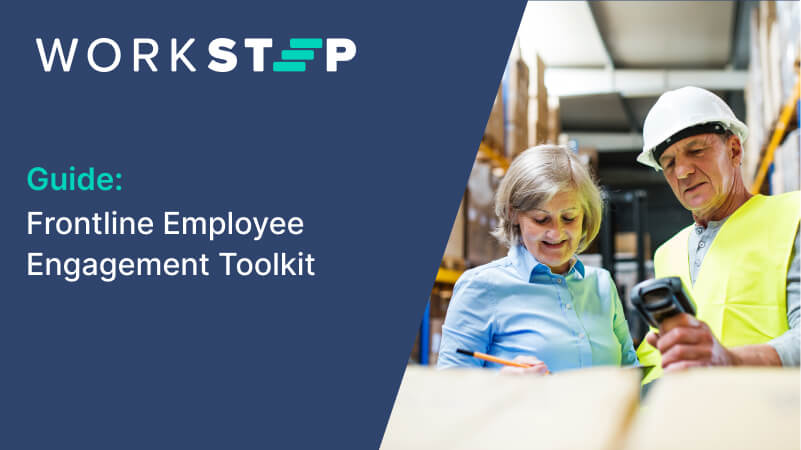Workforce Management Strategies
Striking gold: Meeting workforce expectations and productivity goals
October 23, 2023
WorkStep and Supply Chain Brain sat down with Jon Cox, Vice President of Talent Development, NFI Industries and Grant Stephens Vice President Talent Management, JB Hunt to learn how these supply chain leaders approach meeting employee expectations and achieving productivity goals. During the discussion, Jon and Grant shared their strategies for navigating a new normal, identifying areas of opportunity within their workforce and responding to shifting frontline expectations. The experts also shared how they’ve used employee listening and engagement to identify and address workforce concerns and keep senior leadership in the loop.
Meeting frontline employee expectations and key business goals
Throughout the conversation, both panelists focused on the delicate balance between meeting employee expectations for stability and flexibility, and the unchanging demands for productivity in the supply chain sector. They discussed strategies for navigating this complex landscape, including identifying opportunities to redefine flexibility in a frontline context and applying creative solutions to drive productivity and workforce satisfaction.
On shifting employee expectations, Jon Cox observed that employees have “always wanted an engaged manager that provides them feedback and development. They’ve always wanted career stability and mobility,” but noted that in the past employees “may have always needed those things, they were maybe more willing to stay put if they weren’t having that satisfied as much. Whereas now, I think they’re really saying, how are you going to do this for us?”
Cox went on to say that it’s important for leaders to think creatively about how to meet the demands of their frontline workforce. As he noted, a frontline role is “inherently not as flexible a role.” Cox explained that “it’s incumbent on us as leaders to think differently about what it might mean to be flexible…I think there are different ways to be flexible beyond just that hybrid work model, and that’s what we have to tackle and address.” In Cox’s view, this could mean thinking differently about shifts, attendance policies or even hiring practices.
Grant Stephens echoed the sentiment that scheduling is a key area of opportunity for leaders explaining, “scheduling is key in our opinion. And the key to a great schedule is great proactive communication and partnership between our leaders and our employees. We do our best to work with our employees on what life events they have coming up and do our best to schedule such that they can be present for those important moments. When feasible, we’ve implemented flex staff models where employees can float to cover shifts in assignments.”
Communication is another area Stephens and JB Hunt have invested in. Stephens explained, “we’ve increased and altered the way that we communicate with our frontline workers. In addition to communication hitting their mobile devices we have kiosks and televisions at different work locations where employees can engage or find useful resources.”
Ultimately, Stephens explained, all of the workforce investments and initiatives help support the need for flexibility by demonstrating leadership’s commitment to people. “So all these things, they may not directly respond to an employee wanting more flexibility,” noted Stephens, “but our hope is that these things will outweigh the lack of flexibility where we can’t make adjustments as compared to some white collar jobs.”
Building a strong, consultative partnership between HR and Operations
Stephens and Cox both emphasized how important it is for HR leaders to partner closely with their Operations counterparts, in order to design and execute impactful workforce initiatives. Both leaders stressed the importance of relationship-building, continuous communication, collaboration, and establishing a strategic partnership with operations leaders.
Cox highlighted the effectiveness of a consultative approach through collaboration and expertise-sharing. In addition, t’s important for HR leaders to move quickly, Cox explained “shared services and HR talent, we’ve got to match that pace of operations and when there’s an issue, we’ve got to be able to address it. We have to iterate on solutions.”
Stephens agreed and also stressed the importance of being close to the people that programs and initiatives impact. He went on to share that the biggest mistake a leader can make is to “go create a program and think that it’s the best thing in the world but…if there’s misalignment, either between me as an HR leader and our CEO or amongst the executive leadership team, it’s gonna make things harder for all of us to do everything that we want to do [including] making the lives better for our employees.”
Prioritizing the voice of your frontline employees
Throughout the conversation, the importance of continuous listening and feedback, recognizing the value of individual employees, and investing in the company culture was made clear. Through a focus on employee listening, both Cox and Stephens have been able to help their organizations address the needs of their frontline workforce in real-time.
Stephens shared how JB Hunt has focused more on employee listening, post-Covid. He explained that, after the pandemic, “we felt that we really needed to listen differently. We have been listening more broadly, more deeply and systematically in the last couple of years…Extending more olive branches has seemingly helped. Even if we can’t meet all employee demands I think there’s just something there from employees if they can feel, you know what, at least I’m being listened to.”
Cox echoed Stevens’ sentiments and highlighted the impact of WorkStep, NFI’s employee engagement tool. Cox shared, “we have that built-in regular cadence where operation leaders are coming together with HR partners, with leaders from the talent team. They’re looking at the data; they’re strategizing and action planning together. It’s been a really powerful tool.”
Tying it all together
In the end, the panelists agreed that the lifeblood of every organization is its people. Investing in people and prioritizing their feedback will lead to higher employee engagement, lower workforce turnover, fewer safety incidences and a better bottom line.
Zoe Morin, | zoe.morin@workstep.com
Zoe Matho Morin is the VP Marketing at WorkStep. WorkStep is an employee engagement solution that helps organizations engage and retain their frontline workforce. Prior to WorkStep, Zoe led marketing at a global HR tech company.



